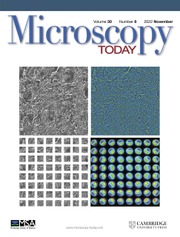Article contents
Extract
After the trauma of birth, a baby is suddenly in a strange new world. The first order of the day is to make sense out of the jumbie of signals in order to form an image of what is out there. This image building proceeds with increased accuracy throughout adolescence. For those who labor in science the process never stops. They continue to try to refine their mental image of nature throughout their professional lives. In this effort, vision is the most valuable natural sense. In a happy blend of poetry and science, Diane Ackerman in her book, A Natural History of Senses, calls eyes “the great monopolist of our senses.” It is, in fact, hard to imagine experimental science without the power of vision. By the same token, any enhancement of visual acuity will promote the precision of our image of nature - the very essence of science.
- Type
- Research Article
- Information
- Copyright
- Copyright © Microscopy Society of America 1996
- 1
- Cited by


